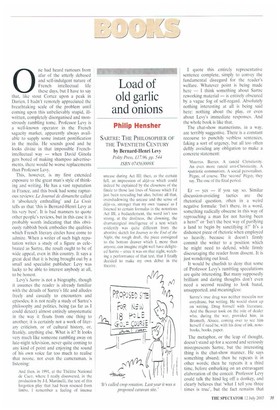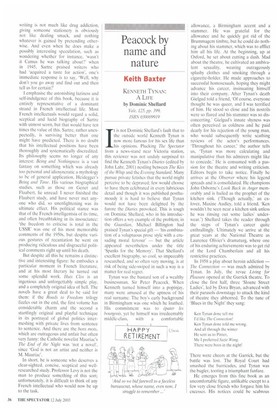Load of old garlic and onions
Philip Hensher
SARTRE: THE PHILOSOPHER OF THE TWENTIETH CENTURY by Bernard-Henri Levy Polity Press, £17.96, pp. 544 ISBN 074563009X Qne had heard rumours from afar of the utterly debased and self-indulgent nature of French intellectual life these days, but I have to say that, like stout Cortez upon a peak in Darien, I hadn't remotely appreciated the breathtaking scale of the problem until coming upon this unbelievably stupid, illwritten, completely disorganised and monstrously rambling tome. Professor Levy is a well-known operator in the French sagacity market, apparently always available to supply some instant pontification in the media. He sounds good and he looks divine in that impossible Frenchintellectual way — when David Ginola gets bored of making shampoo advertisements, there would be worse replacements than Professor Levy.
This, however, is my first extended exposure to the great man's style of thinking and writing. He has a vast reputation in France, and this book had some rapturous reviews: Le Journal de dimanche called it 'absolutely enthralling' and La Croix tells us that 'this is Bernard-Henri Levy at his very best'. It is bad manners to quote other people's reviews, but in this case it is probably worth indicating that this obviously rubbish book embodies the qualities which French literary circles have come to admire. When a writer of such high reputation writes a study of a figure as celebrated as Sartre, the result ought to be of wide appeal, even in this country. It says a great deal that it is being brought out by a small and specialist publisher: Levy was lucky to be able to interest anybody at all, to be honest.
Levy's Sartre is not a biography, though it assumes the reader is already familiar with the details of Sartre's life and alludes freely and casually to encounters and episodes; it is not really a study of Sartre's philosophy and politics, being (as far as I could detect) almost entirely unsystematic in the way it floats from one thing to another; it is certainly not a work of literaly criticism, or of cultural history, or, frankly, anything else. What is it? It looks very much like someone rambling away on late-night television, never quite coming to any kind of point and enjoying the sound of his own voice far too much to realise that noone, not even the cameraman, is listening:
And then. in 1991, at the Theatre National de Caen, where I really discovered, in the production by J-L Martinelli, the text of this forgotten play that had been rescued from limbo, I remember a feeling of intense
unease during Act III; then, as the curtain fell, an impression of deia-vu which could indeed be explained by the closeness of the finale to those last lines of Nausea which I'd just been rereading but also, before all that, overshadowing the unease and the sense of déjà-ru, stronger than my own 'nausea' as I listened to certain formulas in the notorious Act III, a bedazzlement, the word isn't too strong, at the drollness, the clowning, the dramaturgical intelligence of a text which evidently was quite different from the abortive sketch for Journey to the End of the Night, the rough draft, the piece consigned to the bottom drawer which I, more than anyone, can imagine might well have delighted Sartre – since it was on that night, watching a performance of that text, that I finally decided to make my own debut in the theatre.
I quote this entirely representative sentence complete, simply to convey the fundamental disregard for the reader's welfare. Whatever point is being made here — I think something about Sartre reworking material — is entirely obscured by a vague fog of self-regard. Absolutely nothing interesting at all is being said here: nothing about the play, or even about Levy's immediate responses. And the whole book is like that.
The chat-show mannerisms, in a way, are terribly suggestive. There is a constant recourse to punchily verbless sentences, faking a sort of urgency, but all too often deftly avoiding any obligation to make a concrete statement:
Maurras. Barres. A rancid Christianity. An even more rancid anti-Christianity. A *patriotic communism. A social personalism. Peguy, of course. The 'second' Peguy, they say. The one of the final period.
Er — yes — if you say so. Similar discussion-avoiding tactics are the rhetorical question, often in a weird negative formula: 'Isn't there, in a word, something radically obscene in this way of reproaching a man for not having been a hero?' or 'Isn't the best way of purifying a land to begin by sanctifying it?' It's a dishonest piece of rhetoric when employed so heavily, because it doesn't firmly commit the writer to a position which he might need to defend, while firmly discouraging the reader from dissent. It is just wondering out loud.
It would be churlish to deny that some of Professor Levy's rambling speculations are quite interesting. But many supposedly brilliant and daring thoughts don't even need a second reading to look banal, unsupported, and meaningless:
Sartre's true drug was neither mescalin nor corydrane, but writing. He would shoot up on writing. Drug himself with literature. And the Beaver took on the role of dealer who, during the war, provided him, in Brumath, Alsace, coming over to see him herself if need be, with his dose of ink, notebooks, books, paper.
The metaphor, or the leap of thought, doesn't stand up for a second and seriously misrepresents Sartre, but the interesting thing is the chat-show manner. He says something absurd; then he repeats it in other words; then he repeats it a third time, before embarking on an extravagant elaboration of the conceit. Professor Levy could talk the hind leg off a donkey, and clearly believes that 'what I tell you three times is true', but the fact remains that writing is not much like drug addiction, giving someone stationery is obviously not like dealing smack, and nothing whatever is gained by pretending otherwise. And even when he does make a possibly interesting speculation, such as wondering whether for instance, 'wasn't it Camus he was talking about?' when in 1945, Sartre praised writers who had 'acquired a taste for action', one's immediate response is to say, 'Well, why don't you go away and find out and then tell us for certain?'
I emphasise the astonishing laziness and self-indulgence of this book, because it is entirely representative of a dominant strand in French intellectual life. Most French intellectuals would regard a solid, sceptical and lucid biography of Sartre with utmost scorn, but that would have ten times the value of this. Sartre, rather unexpectedly, is surviving better than one might have predicted. There is no doubt that his intellectual positions have been thoroughly and systematically discredited. Its philosophy seems no longer of any interest: Being and Nothingness is a vast fantasy on something which was already too personal and idiosyncratic a mythology to be of general application, Heidegger's Being and Time. His various biographical studies, such as those on Genet and Flaubert, lie unread: I never finished the Flaubert study, and have never met anyone who did, so unenlightening was its ultimate effect. His political stance was that of the French intelligentsia of its time, and often breathtaking in its insouciance: 'the freedom to criticise is total in the USSR' was one of his most memorable comments of the 1950s, but despite various gestures of recantation he went on producing ridiculous and disgraceful political comments right up until his death.
But despite all this he remains a distinctive and interesting figure: he embodies a particular moment in French literature, and at his most literary he turned out some splendid work. Huis Clos is an ingenious and unforgettably simple play, and a completely original idea of hell. The novels have a great deal to be said for them: if the Roads to Freedom trilogy fizzles out in the end, the first volume has considerable charm and the second a startlingly original and playful technique in its portrayal of global politics intermeshing with private lives from sentence to sentence. And there are the bons mots, which are outrageous and unfair but often very funny: the Catholic novelist Mauriac's The End of the Night was 'not a novel', since 'God is not an artist and neither is M. Mauriac'.
In short, he is someone who deserves a clear-sighted, concise, sceptical and wellresearched study. Professor Levy is not the man to produce something of this sort; unfortunately, it is difficult to think of any French intellectual who would now be up to the task.



































































 Previous page
Previous page